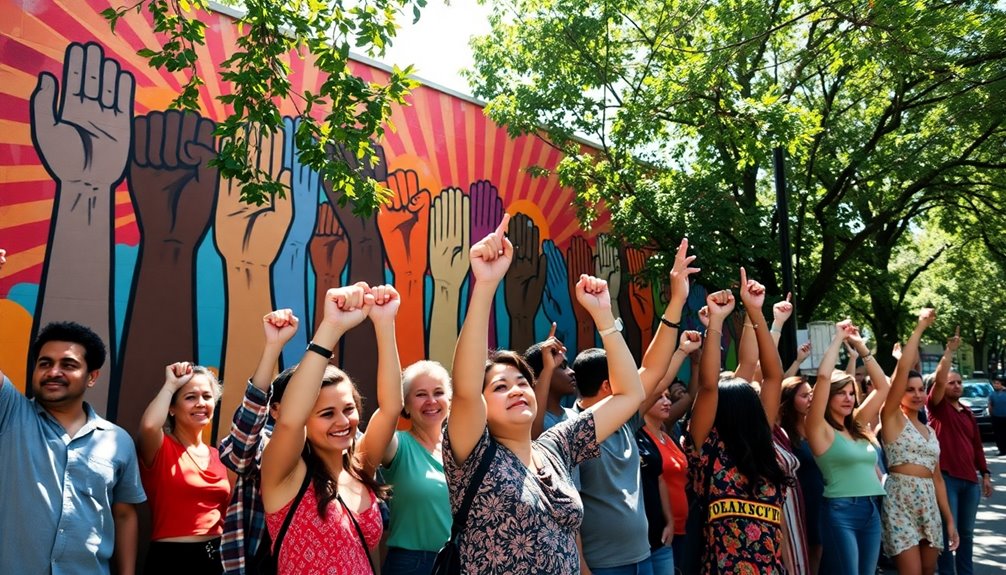Social consciousness is the awareness of social issues that influences your beliefs and actions. It connects you to your community, fostering collaboration for justice and sustainability. This essential concept drives collective advocacy, empowering you to support ethical companies and community initiatives. Historical movements and technology, particularly social media, have propelled social consciousness into the spotlight, encouraging rapid information sharing and mobilization. Yet, challenges like misinformation can cloud understanding. As you explore this transformative idea, you may find fascinating connections between your values and the broader societal landscape around you.
Key Takeaways
- Social consciousness is the collective awareness of social issues that influences perceptions and drives actions for a just society.
- It fosters a sense of interconnectedness, enhancing community identity and promoting collaboration towards social justice and environmental sustainability.
- The evolution of social consciousness is propelled by grassroots movements, technology, and social media, enabling rapid information sharing and global solidarity.
- Challenges such as misinformation and economic inequality hinder effective engagement and understanding of social issues, complicating collective action.
- Socially conscious companies prioritize ethical practices and community impact, reflecting consumer preferences for responsible business and sustainable investment.
Understanding Social Consciousness

Social consciousness plays an essential role in shaping how we perceive and respond to the world around us. It's all about collective awareness of significant social issues, impacting your actions and those of others in society.
When you embrace social consciousness, you start recognizing the interconnectedness of your life with the broader community, fostering a stronger social identity that transcends individualism. This evolution encourages collaboration among diverse groups, allowing you to work together toward common goals, like social justice and environmental sustainability. Engaging in comfort solutions can also enhance your ability to support community initiatives and well-being. Additionally, understanding filial responsibility laws can aid in addressing the financial aspects of caregiving within families, highlighting another layer of social consciousness. The practice of fostering community support networks can further strengthen these collaborative efforts. Furthermore, being aware of the importance of safe sleep environments can contribute to the overall health and wellbeing of families in your community.
By engaging in advocacy and social activism, you contribute to the well-being of your community and help address pressing social issues. Moreover, cultivating social consciousness can enhance community well-being, making it fundamental for personal and collective growth. Engaging in mindfulness techniques can also improve your ability to understand and respond to social issues effectively.
You can develop this awareness through educational experiences and active participation in local initiatives. By staying engaged, you not only better understand the social context that shapes your identity but also empower yourself to make a meaningful impact.
In short, understanding social consciousness helps you navigate the complexities of society, emphasizing the importance of unity in pursuing a just and equitable world.
Importance of Social Awareness

Awareness of the social issues around you is essential for creating a more just and equitable society. By enhancing your social consciousness, you foster a sense of community and unity, encouraging collaboration among diverse groups toward common goals. This awareness drives individual and collective actions in social activism, as seen in movements advocating for social justice and environmental sustainability. Furthermore, the growing demand for transparency in private equity highlights the importance of ethical practices in investment decisions. Additionally, the integration of AI-driven analytics in assessing social trends can help identify and address pressing societal issues more effectively. Maintaining emotional alignment can enhance your ability to contribute positively to societal change. Moreover, recognizing the significance of inflation-protected annuities can provide financial security that supports social initiatives.
Recognizing significant social issues like poverty and inequality is vital for inspiring policy changes that improve societal conditions. When you support socially conscious companies that prioritize ethical practices and fair treatment of employees, you contribute to a culture of accountability. This often leads to increased customer loyalty, as consumers today prefer brands that align with their values.
Moreover, the rise of socially conscious investing reflects a growing trend among investors to align financial decisions with social impact. Your investment choices can promote positive societal changes, reinforcing the importance of social awareness. Additionally, the concept of sustainable practices in business is increasingly recognized as a cornerstone of social responsibility and ethical consumerism.
Historical Perspectives on Social Consciousness

Throughout history, the evolution of social consciousness has been shaped by various thinkers and movements that reflect society's changing values and concerns. Early philosophers like Karl Marx argued that economic relations influence collective consciousness, suggesting that social being shapes consciousness. Later, sociologists such as Émile Durkheim explored how shared beliefs bind society, emphasizing social norms' role in individual behavior.
The late 20th century brought modern social movements, where grassroots efforts highlighted systemic injustices, raising awareness and inspiring collective action. Today, the internet and social media allow rapid information sharing, fostering global solidarity around pressing issues like climate change and racial equality. Additionally, AI technologies have begun to play a role in analyzing and amplifying social issues, thereby influencing public discourse.
Here's a quick overview of these historical shifts:
| Era | Key Concepts |
|---|---|
| Early Thinkers | Economic relations shape consciousness |
| 1960s Movements | Grassroots efforts against systemic injustices |
| 21st Century | Corporate responsibility and demand for transparency |
As consumers increasingly value ethical behavior from companies, social consciousness continues to intertwine with corporate practices, reflecting a shift towards prioritizing social impact alongside financial success.
The Role of Collective Identity

Collective identity plays an essential role in shaping how people engage with social issues and each other. When individuals come together through shared experiences, beliefs, and values, they create a powerful bond that fosters social consciousness. This sense of belonging can drive collective action and enhance social solidarity, leading to impactful social movements.
- Imagine the energy of a community rallying for civil rights.
- Picture volunteers uniting for a cause, transforming lives through community service.
- Visualize activists passionately advocating for environmental justice. Additionally, understanding the importance of financial considerations in community programs can strengthen the support systems that promote social consciousness.
Furthermore, fostering positive thinking within communities can strengthen these bonds and empower collective efforts towards social change.
Social Consciousness in Action

When people unite around shared values and experiences, their social consciousness often translates into tangible actions that address pressing issues. You might notice this in community volunteering initiatives, where individuals come together, fostering a sense of collective responsibility while raising awareness about social issues.
These efforts can range from supporting local shelters to participating in environmental sustainability movements, like campaigns against plastic pollution.
Socially conscious investing also plays an essential role in driving change. You can support companies that prioritize ethical practices and fair labor practices, ensuring that your investments contribute positively to society. This alignment with social consciousness reflects a commitment to social justice and employee well-being.
Moreover, collective actions, such as protests and awareness campaigns, demonstrate how passionate individuals mobilize around shared values. These activities not only raise awareness but also push for meaningful social change. For example, the Premier League's new focus on South Asian talent shows how sports organizations aim to enhance diversity and representation in their teams.
Challenges to Social Consciousness

You might find that individualism often overshadows the importance of collective action, making it hard to address social issues effectively.
Misinformation can cloud your understanding, preventing meaningful discussions about the complexities of social challenges.
Additionally, economic inequality shapes your awareness, limiting how different social classes perceive and engage with these pressing problems.
Individualism vs. Collectivism
The ongoing debate between individualism and collectivism presents significant challenges to social consciousness. Individualism emphasizes personal autonomy and self-reliance, often neglecting the collective responsibilities that foster social unity. On the other hand, collectivism encourages prioritizing group goals and the common good, enhancing social consciousness through shared identity and collaboration. This tension can complicate how you view your role in society.
- Imagine a community where everyone thrives together, recognizing their interdependence.
- Picture individuals actively engaging in collective efforts, driven by a common purpose.
- Visualize a society where personal freedoms harmonize with social cohesion.
For social consciousness to flourish, you must acknowledge that your actions impact the community. Balancing individual pursuits with collective awareness is essential for societal progress.
Karl Marx suggested that productive relations shape social consciousness, highlighting how individualistic pursuits can undermine collective awareness. Embracing both individualism and collectivism allows you to navigate these tensions more effectively.
Misinformation and Awareness
Misinformation's rapid spread in today's digital landscape poses a formidable challenge to social consciousness. It distorts public perception and undermines collective awareness of critical social issues. When misinformation circulates, it creates a cycle of ignorance that affects your ability to engage in informed civic engagement.
Studies show that people who encounter false information are less likely to seek out factual content, which ultimately diminishes their understanding of important topics.
This prevalence of misinformation can exacerbate social divides, leading to polarized viewpoints that hinder constructive dialogue and collaboration. As narratives clash, the potential for unity and mutual understanding diminishes, leaving you with a fragmented view of the world.
To combat this, awareness campaigns and educational programs focused on media literacy are essential. They help you develop critical thinking skills, enabling you to discern misinformation and enhance your social consciousness.
Economic Inequality Impact
Economic inequality starkly divides societies, creating barriers that hinder social consciousness and collective engagement. With the richest 1% owning over 40% of global wealth, disparities in access to resources and opportunities grow wider. This reality affects how community members view each other and engage with social issues.
- Imagine a single parent struggling to afford groceries while wealth accumulates in the hands of a few.
- Picture a group of activists rallying for a $15 minimum wage, faced with systemic barriers that limit their reach.
- Visualize neighborhoods where crime rates soar, eroding social trust and civic engagement.
High income inequality deteriorates social cohesion, leading to lower happiness and increased crime rates. Marginalized groups often find it challenging to unite for collective action, making it tough to advocate for change.
However, addressing economic inequality through progressive taxation and social welfare programs can enhance social consciousness. Research shows that nations with robust social safety nets experience higher levels of social trust and civic engagement. Additionally, implementing retirement savings plans can help individuals build financial stability, contributing to a more equitable society.
Socially Conscious Companies

When you think about socially conscious companies, consider how they prioritize ethical business practices and community impact initiatives.
These organizations not only focus on sustainable product development but also actively engage in making a positive difference in the world around them.
Ethical Business Practices
Ethical business practices are essential for fostering a responsible corporate culture, and many socially conscious companies are leading the way. By prioritizing fair treatment of employees and adopting sustainable practices, these companies not only enhance employee morale but also create a positive societal impact.
Reflect on the following aspects that shape their approach:
- Equitable pay and safe working conditions that boost productivity.
- Eco-friendly materials and waste reduction efforts that appeal to conscious consumers.
- Community service initiatives that reflect their commitment to social responsibility.
These companies often adopt a corporate structure that integrates social consciousness into their decision-making processes. Benefit corporations, for example, are legally required to evaluate their impact on all stakeholders, ensuring that ethical practices are at the forefront. This commitment can lead to improved brand reputation and customer loyalty, as consumers increasingly support brands that align with their values. Moreover, research shows that socially responsible investing can yield competitive financial returns while fostering a sustainable future. Additionally, cultivating cultural intelligence is vital for socially conscious companies to navigate diverse consumer markets effectively. These strategies can enhance their ability to adapt to changing regulations, such as personal debt forgiveness bills, which reflect broader societal shifts toward equity and responsibility. Furthermore, understanding trademark registration can help these companies protect their brand identity while promoting ethical practices in their marketing strategies.
Community Impact Initiatives
Socially conscious companies are making a significant difference through community impact initiatives that extend beyond their immediate business interests. By prioritizing ethical practices, these organizations actively contribute to positive community impact and social welfare. A growing number of these companies are also exploring Bitcoin IRA options to diversify their investments and support social enterprises.
Benefit corporations, for instance, are legally bound to balance profit motives with a commitment to societal benefits, integrating social responsibility into their business models.
Engaging in community impact initiatives not only fosters societal benefits but also boosts employee satisfaction. Workers often feel a sense of pride in being associated with socially responsible practices, leading to higher retention rates.
As consumer preference shifts, research shows that over 70% of millennials are willing to pay more for products from socially responsible companies. This trend has driven the growth of ESG investments, with assets surpassing $30 trillion globally. Furthermore, the rise of cryptocurrency basics has encouraged companies to explore innovative funding methods for social projects.
Sustainable Product Development
Sustainable product development is revolutionizing the way companies approach their offerings, focusing on minimizing environmental harm while maximizing social and economic benefits. As you explore this concept, you'll find that socially conscious companies prioritize eco-friendly materials and ethical labor practices. They're not just about profit; they care about their impact on the world. Quorum sensing in bacteria illustrates how communication and collaboration can lead to more effective and sustainable practices. Additionally, philosophical exploration encourages deeper self-reflection on the choices we make regarding consumption.
- Using renewable resources to craft innovative products
- Implementing fair trade practices for equitable supply chains
- Reducing waste to create a positive environmental impact
With the global market for sustainable products projected to reach $150 billion, consumer demand for environmentally friendly and socially responsible options is undeniable. Benefit corporations, which must consider the effects of their decisions on all stakeholders, are leading this charge. Investment in sustainable practices not only improves environmental outcomes but can also lead to increased profitability. Additionally, companies that embrace Montessori toys often prioritize eco-friendly materials and promote hands-on learning experiences.
By integrating sustainable product development into their business models, these companies enhance their brand reputation while attracting a loyal customer base that's increasingly aware of social consciousness. For instance, the use of solar energy solutions in manufacturing processes can significantly reduce a company's carbon footprint.
As you shop, remember that your choices support companies committed to ethical practices, ultimately shaping a better world for everyone. Embrace the shift towards sustainability and make a difference with each purchase.
Socially Conscious Investing

A growing number of investors are choosing to focus on socially conscious investing, which allocates funds to companies that prioritize positive social and environmental impacts. This investment strategy aligns your financial choices with personal and ethical values, reflecting a commitment to responsible practices.
The three main categories of socially conscious investing—Environmental, Social, and Governance (ESG) criteria, sustainable investing, and ethical investing—aim to support companies that engage in responsible corporate behavior.
By investing in socially responsible companies, you can influence corporate behavior and encourage a greater emphasis on ethical practices. As of 2021, global sustainable investment reached approximately $35.3 trillion, showcasing a significant trend towards socially responsible funds. This growth highlights the increasing recognition that avoiding community harm is vital for both society and the economy.
Moreover, socially conscious investing isn't just about ethics; it also aims for long-term financial returns. Many studies show that companies embracing responsible practices often perform better financially, proving that prioritizing positive social impact can lead to fruitful investments.
Future of Social Consciousness

As we look toward the future, the evolution of social consciousness is being driven by a confluence of technology and collective action. You'll notice how social media amplifies grassroots movements, fostering a sense of interconnectedness among individuals worldwide. This shift isn't just a trend; it's a transformation where sustainability and ethical practices take center stage.
- Communities unite for climate action, leveraging digital platforms to mobilize support.
- Investors increasingly prioritize Environmental, Social, and Governance (ESG) criteria, holding corporations accountable.
- Educational institutions weave social consciousness into curricula, nurturing future leaders in community activism.
Moreover, the rise of data-driven activism empowers you to make informed decisions, equipping you with the tools to tackle social issues effectively. As more people recognize the impact of socially conscious investing, a profound change is underway.
This interconnected approach guarantees that economic and social factors work in harmony, paving the way for a more equitable society. The future of social consciousness isn't just about awareness; it's about action, collaboration, and creating sustainable solutions for generations to come.
Embrace this shift, and be part of the change.
Frequently Asked Questions
What Is the Concept of Social Consciousness?
Social consciousness is your awareness of societal issues and challenges that affect your community.
It's about recognizing how your actions impact others and understanding your role in promoting social unity.
This evolving awareness can inspire you to engage in activism, volunteer work, or collective efforts to address injustices.
What Does Marx Mean by Social Consciousness?
When Marx talks about social consciousness, he means your awareness shaped by the material conditions and economic relations around you. Your thoughts and beliefs are influenced by the society you live in, not the other way around.
As you experience struggles or changes in your economic environment, your understanding of class and collective interests evolves.
Fundamentally, recognizing your social context is key to fostering awareness and driving societal change.
What Are the 5 Levels of Social Consciousness?
They say, "You can't see the forest for the trees."
When it comes to social consciousness, you can explore five levels. First, you gain individual awareness of social issues. Next, you develop group consciousness, identifying with shared challenges.
Then, class consciousness reveals the impact of socio-economic structures. After that, collective consciousness shapes your understanding of societal norms.
Finally, you reach global consciousness, recognizing your actions' effects on a larger scale.
What Is Another Word for Social Conscience?
Another word for social conscience is "social awareness."
When you think about how your actions impact your community, you're tapping into this concept. It's about recognizing social issues and understanding your role in addressing them.
You might also hear terms like "collective consciousness" or "civic responsibility," which emphasize shared values and duties toward society.
Engaging with these ideas helps you become more socially responsible and aware of the greater good around you.
Conclusion
In today's fast-paced world, social consciousness isn't just a trend; it's a movement that's reshaping our values and priorities. You've seen it in how people rally for justice and support ethically-minded businesses. As we push forward, embracing our collective responsibility, remember that every small action counts—like drops creating a ripple in a pond. So, whether you're tweeting from your smartphone or volunteering in your community, you're part of this crucial change. Let's keep the momentum going!










